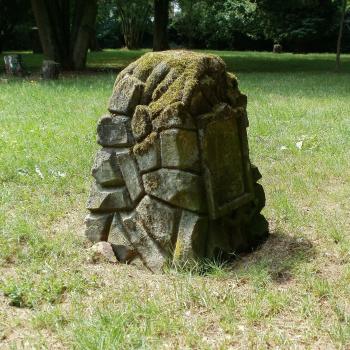Discernment – the ability to judge well or, in religious contexts, understand spiritual progress – is vital to any thriving, stable religious community or practice. Without it, we can become lost, adrift, far from our gods, our spirits, and our people. We can lose ourselves. We can mistake our own voice for the voices of the gods.
But we’ve seen discernment discussed often, and well, in Pagan and polytheist communities. I’ve written about it before and have a tag on one of my other blogs for discernment.
What I want to discuss today is how to handle discernment in groups – both getting and receiving feedback about religious revelations, ideas, and such. How do we interact with each other, help each other grow and learn where we are going religiously? How do we do that with kindness to everyone involved?
(Discernment isn’t just for theists, either. It’s important for any spiritual practice.)
What I like to focus on when discerning with others is honesty and safety. Are people being honest about their experiences and history, and is there space for them to be honest? Are people being safe in whatever they are doing (getting training in necessary skills before doing something possibly dangerous, letting people know if they’re going onto a trip into the wilderness if they feel called to do so, etc.)? Are they in a safe environment where they can communicate their experiences, questions, and concerns when it comes to their religious practice?
(I’d like to point out that these are all tips and ideas from my own experiences and observations and may not be as applicable to some religious communities as others. Still, I hope they are of some use to everyone who read this piece.)
Conflict
The reason I’m writing this piece is because of the inevitable but unfortunately frequent conflict that occurs when discernment is brought into a group. This can be arguments over what the favorite color of a god is to serious disagreements over whether someone is even interacting with a specific god or spirit (or anything at all!). Some of these conflicts can be alleviated and stem more from miscommunication or assumption than intentional hostility.
But there are also times when we can’t avoid conflict. This happens/can happen when two people are firm and unflinching in their differing beliefs or interpretations of experiences (with gods or spirits), when people demand others fall in line with their own beliefs, or when people are hostile to discernment itself.
While it’s good to dialog and try to build community with lots of people, sometimes following the Two Response Rule is the best approach. In my own life, people who are hostile to discernment or questioning itself are far more frustrating than people who think they are Right, and while I may point out the benefits of discernment, I won’t spend time building community with them. This is because discernment keeps our feet on the ground, and those hostile to it often create communities that are headed to implode or only self-centric and self-serving.
One of the best ways to avoid conflict is to realize when there are irreconcilable differences – another is to not assume that everyone is working from the same framework you are.
Asking Not Telling
The biggest problem I’ve seen with discernment in communities happens when two or more people are unintentionally talking past each other, and this almost always happens because someone assumed a theological stance, experience, or belief that isn’t actually at play or relevant.
One of the best ways to keep misunderstandings from happening is to just ask questions. If someone wants help understanding an experience or god, start by asking what sort of framework they’re coming from. In Paganism, which is so broad, this is so important. Does the person you’re dialoging with know the gods as part of One Energy or God? Do they know them as separate and distinct entities? Maybe even ask what ‘god’ means to them, if they’re asking about a god. Are they involved in reconstructionism or coming from an offshoot of Wicca?
Asking questions rather than just telling another person what to do based on your own experiences also helps us address our underlying assumptions about our religious lives and experiences. Do we assume that the gods or spirits are uninvolved or uninterested in human activities, or do we assume they think humans are vitally important? Do we assume that humans can never say no to the gods, or do we think that humans can coerce or bribe the gods or spirits? So many questions can come up when discerning as a community, and it is in those questions and their answers that we grow.
Asking these questions also allows us to give better advice.
Let’s imagine for a moment that we’re a, say, polytheist and very focused on deities and worshiping deities. Someone in our community is asking for help figuring out what is going on with a spirit hanging around them. Maybe in our own practice, in such a situation, we would petition a deity for help. However, the other person in this situation doesn’t want to interact with gods at all, or may not believe gods exist. If we ask questions about their framework or practice beforehand, we would likely give better advice than if we just launched into an explanation of how we would handle it.
While it is great to share ideas about your own practice, we should also be mindful of how we share them. Don’t start with the assumption that of course your practice or belief is correct or universal. Speak consciously! Realize how tone – both online and offline – can affect how someone may receive your advice or ideas. Focus a lot on ‘I’ or ‘me’ statements when it comes to sharing your own techniques, experiences, or practices.
Discernment is how we keep ourselves on the ground. It’s how we don’t get lost in wonderland. It’s how we stay honest. And helping each other go through the process of discerning religious or spiritual experiences lets us address underlying assumptions, issues, or problems in our own selves, and because of that it is undeniably necessary.
















